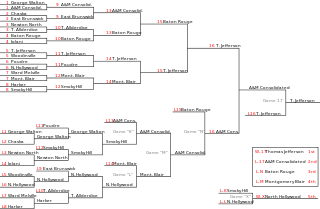
A single-elimination, knockout, or sudden death tournament is a type of elimination tournament where the loser of each match-up is immediately eliminated from the tournament. Each winner will play another in the next round, until the final match-up, whose winner becomes the tournament champion. Each match-up may be a single match or several, for example two-legged ties in European sports or best-of series in American pro sports. Defeated competitors may play no further part after losing, or may participate in "consolation" or "classification" matches against other losers to determine the lower final rankings; for example, a third place playoff between losing semi-finalists. In a shootout poker tournament, there are more than two players competing at each table, and sometimes more than one progressing to the next round. Some competitions are held with a pure single-elimination tournament system. Others have many phases, with the last being a single-elimination final stage, often called playoffs.

A double-elimination tournament is a type of elimination tournament competition in which a participant ceases to be eligible to win the tournament's championship upon having lost two games or matches. It stands in contrast to a single-elimination tournament, in which only one defeat results in elimination.

Finland competed at the 1912 Summer Olympics in Stockholm, Sweden. The Grand Duchy of Finland was part of the Russian Empire at the time, but Finland's results are kept separate from those of Russia. In the Opening Ceremony Finland's team paraded under the national insignia flag of a Swedish-speaking female gymnastics club in Helsinki. 164 competitors, 162 men and 2 women, took part in 49 events in 10 sports.

Denmark competed at the 1912 Summer Olympics in Stockholm, Sweden. 152 competitors, 151 men and 1 woman, took part in 46 events in 13 sports.
The Greco-Roman featherweight competition at the 1912 Summer Olympics was part of the wrestling programme.
The Greco-Roman lightweight competition at the 1912 Summer Olympics was part of the wrestling programme.
The Greco-Roman middleweight competition at the 1912 Summer Olympics was part of the wrestling programme.
The Greco-Roman light heavyweight competition at the 1912 Summer Olympics was part of the wrestling programme.
The men's Greco-Roman bantamweight was a Greco-Roman wrestling event held as part of the Wrestling at the 1924 Summer Olympics programme. It was the first appearance of the event. Bantamweight was the lightest category, including wrestlers weighing up to 58 kilograms.
The men's Greco-Roman bantamweight was one of 13 wrestling events held as part of the wrestling at the 1928 Summer Olympics programme. It was the second appearance of the event. The competition was held from August 2 to 4, and featured 19 wrestlers from 19 nations.
The men's Greco-Roman featherweight was one of thirteen wrestling events held as part of the wrestling at the 1928 Summer Olympics programme. The competition was held from August 2 to 5, and featured 20 wrestlers from 20 nations.
The men's Greco-Roman light heavyweight was one of thirteen wrestling events held as part of the wrestling at the 1928 Summer Olympics programme. The competition was held from August 2 to 5, and featured 17 wrestlers from 17 nations.
The men's freestyle featherweight competition at the 1932 Summer Olympics in Los Angeles took place from 1 August to 3 August at the Grand Olympic Auditorium. Nations were limited to one competitor. This weight class was limited to wrestlers weighing up to 61kg.
The men's Greco-Roman featherweight competition at the 1936 Summer Olympics in Berlin took place from 6 August to 9 August at the Deutschlandhalle. Nations were limited to one competitor. This weight class was limited to wrestlers weighing up to 61kg.
The men's Greco-Roman light heavyweight competition at the 1936 Summer Olympics in Berlin took place from 6 August to 9 August at the Deutschlandhalle. Nations were limited to one competitor. This weight class was limited to wrestlers weighing up to 87kg.
The men's freestyle featherweight competition at the 1936 Summer Olympics in Berlin took place from 2 August to 4 August at the Deutschlandhalle. Nations were limited to one competitor. This weight class was limited to wrestlers weighing up to 61kg.
The men's freestyle lightweight competition at the 1936 Summer Olympics in Berlin took place from 2 August to 4 August at the Deutschlandhalle. Nations were limited to one competitor. This weight class was limited to wrestlers weighing up to 66kg.
The men's freestyle welterweight competition at the 1936 Summer Olympics in Berlin took place from 2 August to 4 August at the Deutschlandhalle. Nations were limited to one competitor. This weight class was limited to wrestlers weighing up to 72kg.

The men's Greco-Roman flyweight competition at the 1964 Summer Olympics in Tokyo took place from 16 to 19 October at the Komazawa Gymnasium. Nations were limited to one competitor.
The men's Greco-Roman heavyweight competition at the 1964 Summer Olympics in Tokyo took place from 16 to 19 October at the Komazawa Gymnasium. Nations were limited to one competitor.





